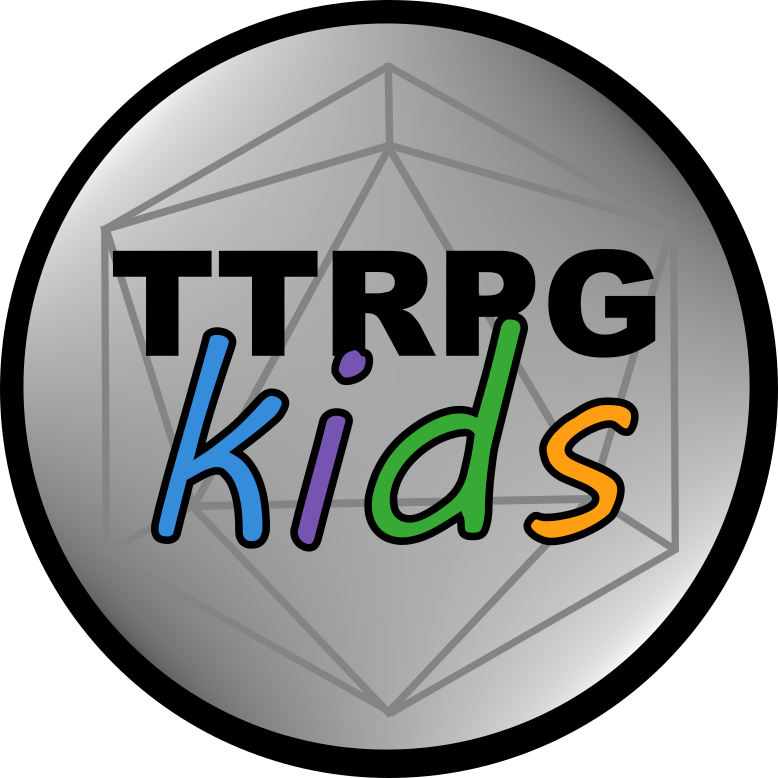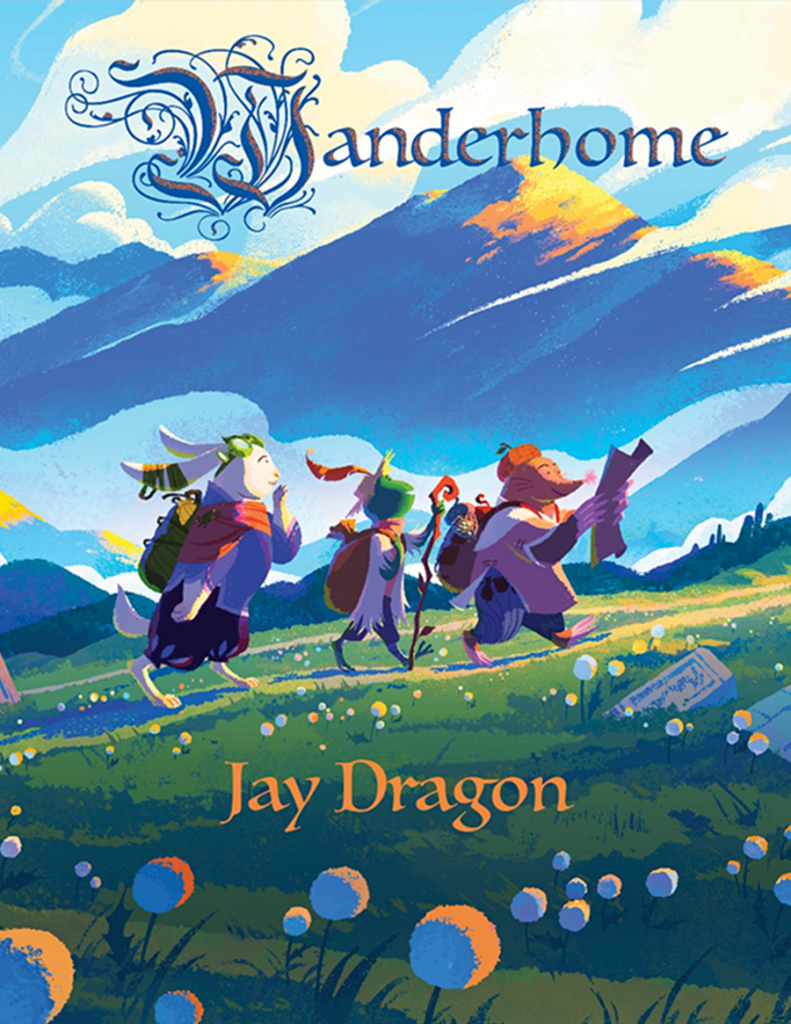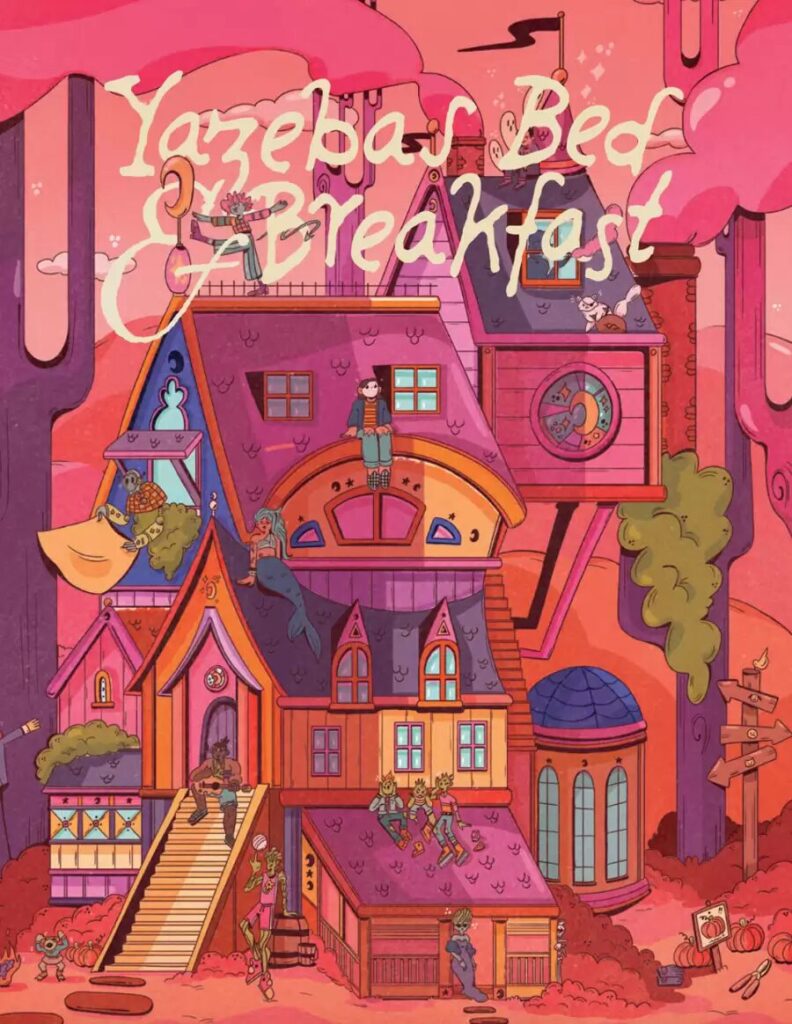Interview with Jay Dragon on meaning in games, respecting the concept of the child, and designing with intention
During GenCon, I had the opportunity to chat with Jay Dragon about her experiences designing games that appeal to families, and how there was intention built into that in a way that honors what a child seeks, whether that child be the inner child of an adult or a person who is young by age. Read on in our interview here, and I hope you enjoy our conversation.
*This post may contain affiliate links. At no additional cost to you, I may earn a small commission from purchases made using them. TTRPGkids uses this to keep the site going. Read full disclosure here.
What is your backstory? What cool stuff do you do? What have you worked on?
I got my start in LARP when I was about 13-14. I worked for the Wayfinder Experience, which is a LARP summer camp in upstate New York; a great place to send your kids, by the way.
I finally started playing tabletop games in college, and I was really fascinated by them. I started writing tabletop games in 2018 or so. I was writing LARPS before them, but tabletop was so exciting.
There was a chunk of time where I didn’t really have a place to live, and I had dropped out of college and was working on this game, Sleepaway, and I ended up putting that out in the world. From there, Wanderhome, and from there, the world!
That’s my lore dump!
I have played Yazeba’s Bed & Breakfast with my kid and also solo. I love how you can jump in and out of modular episodes. Was there any particular inspiration behind that format?
The big thing was that Mazie and I were thinking a lot about adventures and rulesets for different characters and activities. We had both played so many different combinations of games and so many modular one-pagers, and there’s a sense that a game can have a lot of games inside of it.
When you play Dungeons & Dragons, you have a lot of adventures, we frame things all the time, and there’s no particular reason why those individual things can’t be codified sets. We were enamored by this idea.
I’d even written a character sheet and Mazie had written rules for that without regard for the rules that I had intended for the character sheet, which immediately opened the door. If I showed you a D&D character sheet, and you started assigning meaning to things, like strength, you would end up with a different set of rules even though it’s the same character sheet.
When we started with Yazeba’s, in particular, it was a bit of echolalia. I had the phrase stuck in my head, and it took us a bit to figure out what we wanted to do. There was a lot of playstorming, brainstorming but also playing out things and working through made-up scenarios. That freeform design method is how it started.
Do you have a favorite moment or story that either you have experienced playing one of your games or that someone has shared with you?
What a daunting question!
I know!! I’m sorry. Asking to pick one moment is hard!
When I make a game it’s because I’m going to want to play that game.
So, there’s so many moments where it’s going exactly the way I want it to go, and that’s wonderful! Then there’s so many moments where it’s not going the way I expected, and isn’t that wonderful too?!
The game surprises you.
The moments that I come back to often that I don’t think people expect me to come back to are moments where the game failed.
When we’re playing Yazeba’s and we pause the game for 20 minutes to talk about menstruation or we’re playing Wanderhome and we have to stop to really work through, “hey, my character would kill this person, so what on Earth do we do? How do we proceed?”
It feels like the game itself fails, but the conversation and the negotiation come to life, and the game feels very alive.
I feel like my favorite is going to be my most recent good moment.
To me, the moment I think that I remember is at the end of 10 Candles, which is not one of my games, but is the most impactful 5 seconds you can have playing an RPG.

In 10 Candles, the candles are lit, one-by-one, they go out, and at the very end, there’s a recording played of all of your voices from the start of the game. The recording ends, and the GM is told to sit in silence until someone else breaks the silence.
The rules are very clear. This is what 10 Candles is built for.
It is a 3 hour build up to a 5 second pause.
That blew my mind.
That was what fundamentally shaped the moment of RPGs for me.
It’s the experience without a story. This thing that happens to you actively, and there’s just something in it that speaks to a deep part of your soul.
You want it to evoke that feeling and all the emotion built up into it.
It’s meaning. Like, picking up a random rock off the ground. That rock initially has no meaning, but if I say, “this is my friend named Claude”, suddenly Claude matters. If we spend a week talking about Claude and I take Claude to Stake & Shake, suddenly Claude is developing all this emotional weight.
Tabletop RPGs are how we figured out we can do that one person. It doesn’t have to be organic or incidentally. It can be intentional. The mechanics and everything there are building up that meaning.
It can transform an arbitrary set of ideas into something weight and meaningful and powerful.
It makes me think of the Sesame Street skit with Elmo and Rocko.
Yes! Absolutely!
I am a strong advocate for making all-ages TTRPGs not just for kids but for grown ups too, because we’re all kids inside and we want everyone to play together. Possum Creek Games, in particular, hits that vibe for me. Is this intentional?
It was extremely intentional.
I was a precocious child. I had a lot of friends whose inner child is very childlike and they enjoy the bright colors, and… for me, my inner child listens to jazz and wears sweater vests and has very complicated opinions about things.
My inner child is a loser, and I love her, but she’s a NERD. I say this knowing that if I said it to her face, she’d be like… yeah.

When I make games, what I’m thinking about is the 10 year old sitting on the floor of Barnes & Nobles reading Changeling: The Lost, right?
My parents are left-leaning, they’re very progressive, and a big part of their philosophy was to now censor stuff from me. They’re artists. I saw lots of paintings of genitalia, and that was just part of the world.
So, I’m making games that exist in the world, and I want to make sure that a kid can enjoy but I don’t care much about things that are targeting kids. Kids are small adults who have not yet learned the context for everything.
The kindest thing that you can do is to say, “here is how things are! You might not have context for everything, so let me help you contextualize things!”
People ask if Wanderhome is a good kid’s game. If I was a kid and with a group of kids, we wouldn’t choose to play Wanderhome. We would choose to play some gory, shoot ‘em up, nasty thing because that’s appealing when you’re a child.
Wanderhome is a good family game, Yazeba’s is a good family game, but it’s not a game where I’m imagining a group of 9 year olds playing this.
I can try to write a game where I imagine a family playing it, and I can also imagine an 8 year old or a 10 year old at Barnes & Nobels reading it and wanting to run it for their friends.
But I’m never going to try to do Bluey or Baby Looney Toons. I’m never going to make RPG Baby Looney Toons.
When I was a kid, there was Looney Toons, and there was Baby Looney Toons, and I thought Baby Looney Toons was the worst thing on the planet. It was so patronizing and insulting. Why do you think that just because I’m a child, I need to see an adult’s idea of what babies are.
I know as an adult, I know there’s my own view of the cultural institution or concept of the child that I’m projecting onto all children, that’s how we exist in the world. It’s a bias that you have to unlearn, but it also means that I don’t dare try to tell a child what they should want.
I want to make something with feeling and then know that kids will be drawn to it.
It’s respecting their intelligence and autonomy to choose what kind of content they want to consume and where they want it to go.
At the end of the day, kids love to play games, but they don’t need RPGs like a group of adults do. The thing that kids need when they play games is a framework for resolving disputes, but they don’t need a framework for creating fiction.
Kids will just do it.
But, if you’ve got two kids, they will not be good at how to align their ideas, so a game that would be for kids would be a game that prioritizes giving them tools to align their ideas, but does not really care about trying to frame what they’re imagining.
It’s like that social-emotional element where, I say adults in a general term because not all adults have had the opportunity to build a strong social-emotional skills base, adults have a handle on the social elements a little more whereas kids have a handle on the creativity. Kids have that down.

I always go back to Catherynne M. Valente, The Girl Who Circumnavigated Fairyland in a Ship of Her Own Making. It’s a very good book for children and adults, and there’s a beautiful quote from it. September, the main character, has flown away with the wind and is off to fairyland. She doesn’t turn to say good-bye to her parents, and she doesn’t even think of them:
One ought not to judge her: all children are Heartless. They have not grown a heart yet, which is why they can climb high trees and say shocking things and leap so very high grown-up hearts flutter in terror. Hearts weigh quite a lot. That is why it takes so long to grow one. But, as in their reading and arithmetic and drawing, different children proceed at different speeds. (It is well known that reading quickens the growth of a heart like nothing else.) Some small ones are terrible and fey, Utterly Heartless. Some are dear and sweet and Hardly Heartless At All. September stood very generally in the middle on the day the Green Wind took her, Somewhat Heartless, and Somewhat Grown.
― Catherynne M. Valente, The Girl Who Circumnavigated Fairyland in a Ship of Her Own Making
I love that part.
I do too. Especially having a 7 year old who kind of joggles between the two states, I feel that. It’s a good way to state that.
I love it also because of the association of heartlessness….
It’s not “bad”.
Right. It’s lightness. You’re airy, you’re floating, you’re careless.
It’s a freedom.
You’re not weighed down by care.
Then, the second book is where September returns back to Earth, and she’s grown up a bit, so that heart is part of her nature. The way that it’s described is that it’s feeling very raw for the first time. A teenager has not yet learned how to moderate it.
As an adult, if we say, “I love you”, the sentence needs context. Is it like the way Romeo loves Juliet or like family or some other different context.
When a teenager says it, there’s no meta anymore, there’s no comparison point.
Is there anything we missed talking about that you’d like to speak on?
It’s such an odd way we’ve grown to talk about kids. I think that because I’m part of a lot of marginalizations that get talked about a lot when I’m not in the room…. A lot of people have opinions on trans women, but I’m not there for that. A lot of people love having opinions on fat people, and I’m not there for that.
Psychiatry is an institution; if you are mentally ill psychiatrist, they will kick you out.
So, it’s like, we’ve built this thing to help mentally ill people, but you can’t yourself be mentally ill. The room cannot contain that person that is the subject.
I think that I’m very aware that there is a silent conversation here where we both have children inside of us, so we’re trying to speak to the child that is inside of us and what our memory and care for that is. I think maybe for you a bit more, since you have a child you can talk to.
Yeah, there’s a bit of an external realization in my everyday life.
When I say the child in the room, the child is right there.
For me, I’m aware that whenever I try to speak to the condition or construct of the child, I can only ever speak to the construct. I cannot speak to the flesh and blood child.
It’s tricky because, as someone who makes RPGs that appeal to kids, I’m selling to parents, and that is the awful and unfair thing. I think that if I was in the business of making games for kids, parents would never buy them.
OH, that is so hitting the nail on the head!
You have to speak to parents, but then also speak to them in a way that can reach the kid without speaking down to them.
I have to be triply careful as a transwoman because Republicans like to say all kinds of awful things like, “You’re sending covert messages to children by saying they can pick their pronouns. You’re such a monster.”
Yeah, like… oh no, you told someone to explore being themselves.
What a message!
It’s ultimately one of those areas where RPGs are so niche, and it’s not like there’s a lot of larger companies that can target it… I just have to hope that when I make something it reaches someone and can inspire them.
It gets past the author at that point.
I think, when I was a kid, none of the stuff that was impactful to me as a child were things that people were making for kids like me. They didn’t know that some child was going to read Changeling: The Lost. Almost like that, I just need to make art, and it will speak to people, and some of them will grow and tell me the art was impactful. It’s so cool. It’s the nature of art.
Thank you Jay for taking time to discuss! It has been a wonderful opportunity to get to chat with you, and I’m grateful that you gave a bit of time to help others learn from your XP.
You can find Jay’s work here at Possum Creek Games.

If you liked this post, make sure to subscribe to the TTRPGkids monthly newsletter to stay up to date on the latest reviews, tips and tricks, game and podcast list updates, and more! Thank you for playing tabletop RPGs with your kids and sharing this awesome hobby with the next generation!




